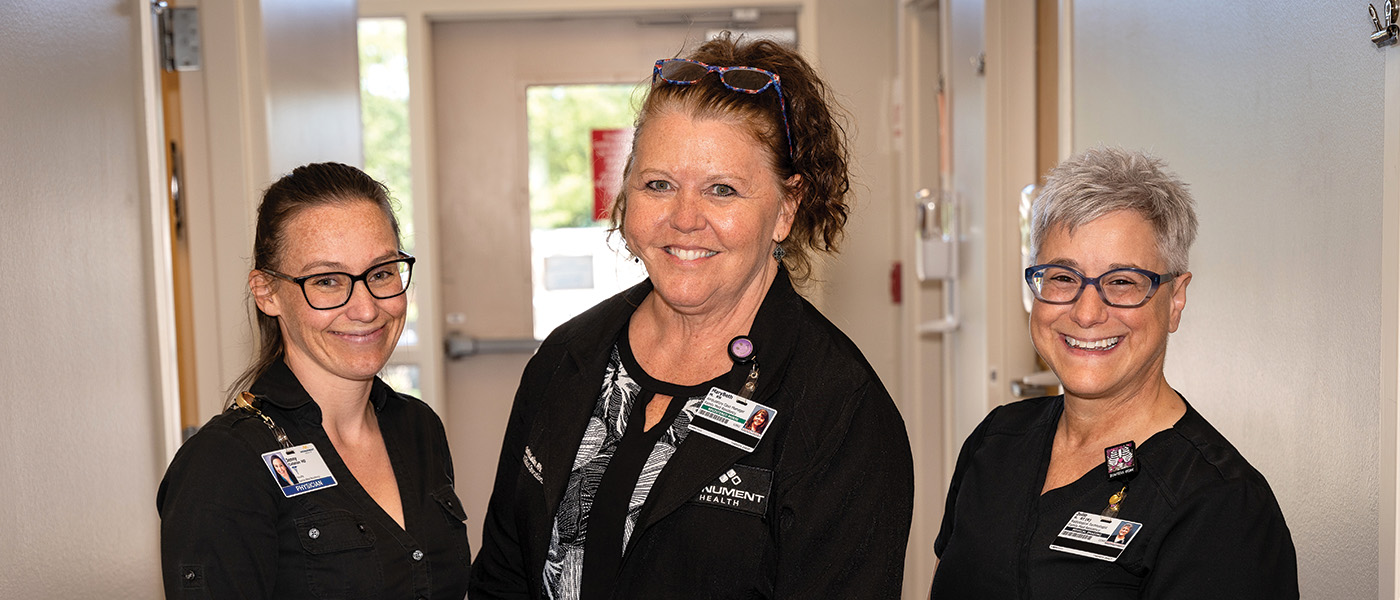In the early 1990s, two health care challenges were emerging in western South Dakota. First, the number of new family physicians practicing medicine in rural areas was not keeping up with demand. Second, the North Rapid City neighborhood was especially underserved.
Regional Health — now named Monument Health — devised a single solution that addressed both challenges. Its Family Medicine Residency Program provides new doctors with three years of residency training in family medicine. And the doctors work primarily at the Family Medicine Residency Clinic just off LaCrosse Street in the heart of North Rapid City.
The doctors work alongside experienced faculty physicians to hone their skills in obstetrics, pediatrics, emergency medicine, internal medicine, geriatrics and more. Most residents deliver more than 100 babies during their training, said Bobbie Schneller, D.O. She has been program director since 2017, and she too is a graduate of the program.
Each year the Family Medicine Residency Program accepts six new medical school graduates. Starting with the 2024 class, the program will expand to eight new doctors each year.
Community Closet
When Jennifer Callahan, M.D., was a second-year resident she saw first-hand how medicine alone is not always enough. She was treating an expectant mother at the Monument Health Family Medicine Residency Clinic in Rapid City. The patient was living on just $300 a month and couldn’t afford baby clothes. Dr. Callahan bought baby clothes, delivered the baby and continued ongoing treatment of mother and child.
“When her baby outgrew the clothes, she brought them back so another mother could use them,” recalled Dr. Callahan, who
is now on the Family Medicine Residency faculty. “It kind of snowballed from there.”
Today the Family Medicine Residency Program’s community closet features a wide range of clothing for patients and accepts donations from the public.
Family Medicine, Rural Health
Since the first graduation in 1997, nearly 150 doctors have completed the program. Sixty-seven stayed in South Dakota, and many have remained with or returned to Monument Health.
Sports Medicine Specialist Hollan Harper, D.O., is a good example. A native of Washington state, he received a Doctor of Osteopathy degree in Pennsylvania. He applied for residency at a number of family medicine programs. He was accepted by Monument Health.
“I was completely unfamiliar with Rapid City before coming here for my Family Medicine training,” he said. “For three years I had the wonderful opportunity to train with some amazing individuals, and I became close friends with many of them. It was primarily friendships my family and I made and the community atmosphere that made us consider staying here in Rapid City.”
Monument Health offered Dr. Harper a sports medicine position at the new Monument Health Orthopedic and Specialty Hospital. After completing a fellowship in Sports Medicine in Texas, he returned to Rapid City in 2020.
The medical clinic provides a range of services for patients of all ages and income levels. The list includes obstetrics and newborn care, minor surgical and dermatology procedures, onsite laboratory and X-ray services, well-child visits, women’s care, vascular screenings, Medicare wellness visits and nursing home patient visits.
Nutrition Training
For Family Medicine residents, nutrition is part of the training. As an exercise, each resident must create a nutritious one-week meal plan for a hypothetical family of four — including a father with diabetes. And they have a budget of $150, the amount a family would receive in Supplemental Nutrition Assistance Program benefits. “It’s very easy to say, ‘Well you need more fish, chicken and fresh fruit in your diet,’ but when they realize how little these patients have and how much these foods cost, it changes how they approach their patients,” said Bobbie Schneller, D.O., Director of the Family Medicine Residency.
Food Pantry
In low-income or rural communities, patients don’t always have access to fresh, healthy foods. They often end up subsisting on fast food or convenience store foods, both of which are high in fats and carbohydrates.
“We can give our patients all the medicine in the world and have these great health care plans. But if they can’t afford it, it doesn’t matter. They don’t get healthy,” Dr. Schneller said. “And so we’re trying to figure out how we can mitigate some of those circumstances for our patients.”
The program’s food pantry distributes about 2,000 pounds of food per month to 45 patients and their families, said Mary Beth McLellan, RN, who has been involved in the pantry since it began. In addition to food, the clinic provides cooking equipment that has been donated by community members.
Services provided at the Family Medicine Residency Clinic:
- Annual exams
- Diabetic retinal screenings
- Laboratory services
- Medical imaging services
- Medicare wellness visits
- Minor surgical procedures,
including vasectomies - Newborn care and
well-child visits - Nursing home patient visits
- Obstetrics
- Primary care for the
whole family - Vascular screenings
- Women’s care
Accepts most major insurance plans including Medicaid and Medicare.

